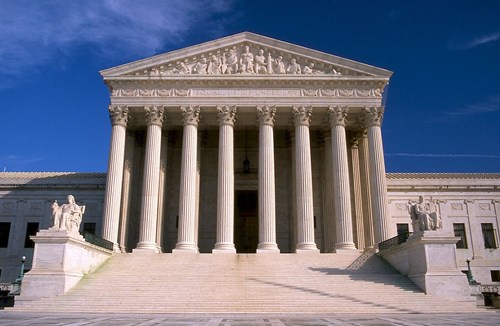In an 8-1 decision, the high court ruled the federal government must pay insurers $12 billion in promised funds under the Affordable Care Act (ACA).

The Supreme Court ruled on Monday that the federal government must honor its obligation and cover the full cost of risk corridor payments, which were set up under the ACA to help health insurers recover some losses for covering a high number of sick and expensive enrollees during the first three years of the program.
RELATED: Obamacare back at the high court—with billions for insurers on the line
The lawsuits were brought separately by Maine Community Health Options, Moda Health Plans, Blue Cross and Blue Shield of North Carolina, and Land of Lincoln Mutual Health Insurance Company, but were consolidated when the Supreme Court agreed to hear the case. The insurer argued that the Department of Health and Human Services (HHS) reneged on a promise to cover some of the losses in the early years of the ACA if claims exceeded premiums.
The case has been closely watched as it has wound its way through the legal system. In 2017, the U.S. Court of Federal Claims sided with insurers, but the ruling was overturned by the United States Court of Appeals for the Federal Court, stating that HHS was not required to make the risk corridor payments because Congress added a budget-neutrality requirement to the program. Federal judges later denied an appeal to rehear the case and the insurers petitioned the Supreme Court to hear the case.
Congress created a “rare money-mandating obligation” and “the government should honor its obligations,” Justice Sonia Sotomayor wrote in the majority opinion. Justice Samuel Alito dissented, stating that the ruling has “the effect of providing a massive bailout for insurance companies that took a calculated risk and lost. These companies chose to participate in an Affordable Care Act program that they thought would be profitable."
The Supreme Court ruling is a big win for insurers. Margaret A. Murray, chief executive officer of the Association for Community Affiliated Plans (ACAP) said the decision “emphasizes the argument we have made all along—the government can’t renege on an unambiguous commitment in Federal law.”
“ACAP-member plans entered the Marketplace with the clear understanding that risk corridor payments would take place as set forth in Federal law. The government reneged, but our plans didn’t. They provided quality, affordable care to millions of Americans only to have the government leave them unpaid bills totaling hundreds of millions of dollars.”
“It’s absurd to ask health plans–or anyone else doing business with the United States government– to price in the notion that Congress might arbitrarily walk away from commitments it makes in Federal law. We’re relieved the Supreme Court agrees.”
RISE reaction
Insurance companies went into the ACA marketplace with their eyes open, noted RISE Executive Director Kevin Mowll. They anticipated the pent-up needs and relied on the government’s commitment to financially protect them from the initial onslaught in the early days of the market. Had the risk corridors not existed, the market might well have not taken off, Mowll said.
The 8-to 1-vote of the Court reflects the fact that the issuers substantially relied upon the government assurances, allowing the marketplace to successfully launch and then, over several painful years, to normalize. Mowll said it's notable that the smaller carriers were the ones to bring this lawsuit because part of the idea behind the ACA marketplace was to introduce competition and to create a level playing field that enabled smaller companies to effectively compete with the larger ones.
"The whole notion of risk adjustment continues to serve as a leveler with regards to the unevenness of health risk selection. However, given the high failure rate among the co-op model plans introduced by the ACA, it is clear that the success of smaller players was far from guaranteed," he said. "Nonetheless, for those whose financial survival relied on the risk corridors, this Supreme Court finding must seem like justice achieved."
